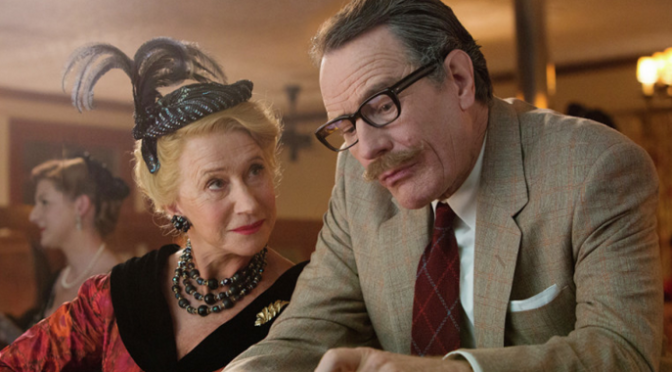For as glamorized as Hollywood’s Golden Age tends to be, it was a dark time for most writers and actors in the business subject to the witch hunts known as the Red Scare. One screenwriter in particular, Dalton Trumbo (best known for Roman Holiday, The Brave One, Spartacus and Exodus–the former two of which had to be written under a pseudonym), a frontrunner among The Hollywood Ten, went through the wringer of persecution.
In Jay Roach’s (not exactly known for “great” films–e.g. Meet the Fockers and Brüno) straightforward retelling of Trumbo’s (played to saucy perfection by Bryan Cranston) plight in the aptly titled Trumbo, we’re given a glimpse not only into how often history repeats itself (witch hunts are a favorite American pastime), but also just how much of a cunt rag Hedda Hopper (Helen Mirren, re-channeling the same energy she did for Teaching Mrs. Tingle) was in helping to fuel the flames of suspicion against Trumbo and his ilk. While others accused, like Arlen Hird (Louis C.K.), aren’t quite as overtly communistic as Trumbo, an active member of the Communist Party of the USA, anyone with a non-Republican viewpoint is seen as a potential defector. This deeply aggravates the likes of everyone from J. Parnell Thomas (James DuMont) to John Wayne (David James Elliott) himself, the head of the Motion Picture Alliance for the Preservation of American Ideals (which sounds like just about the squarest thing ever). But none of the threats, ill opinions or general ire can deter Trumbo from his political stance, nor his prowess as a writer.
Still, Hedda Hopper’s influence is great enough to get Louis B. Mayer himself to cancel Trumbo and a number of other writers’ contracts when Hopper threatens to write all about his communist sympathies in her column. Her strange and sick power over most celebrities of the decade is, indeed, frightening. Even those supposedly loyal to Trumbo, like Edward G. Robinson (Michael Stuhlbarg), feel the pressure and ostracism of the House Committee on Un-American Activities enough to relent and “name names,” as it’s called. Of course, as this occurs, Trumbo is already in jail for his so-called crime of being a communist, much to the dismay of his loving wife, Cleo (Diane Lane, who gets kind of washed out in this role), and children, Nikola (Elle Fanning), Mitzi (Becca Nicole Preston) and Chris (Mattie Liptak). In spite of his separation from them, however, he sustains his will to go on by writing to them often. After serving his sentence, Trumbo’s resolve to fight back is fortified when he realizes he can still make money from screenwriting by using a fake name.
This leads him to win Academy Awards for both Roman Holiday and The Brave One, the latter of which leads the bulk of the Hollywood community to suspect that he is the overtly fake “Robert Rich” unable to accept the award in person. But by not confirming that it is, in fact, he who has been writing most of what people see onscreen, Trumbo carries out his genius plan to undermine the entire concept of The Hollywood Blacklist. By the time 1960 rolls around, it’s clear that the strength of the old guard is wearing away, as made evident by Kirk Douglas’ (Dean O’Gorman) cavalierness in asking Trumbo to do a rewrite for the script to Spartacus. After Douglas, Otto Preminger (Christian Berkel) follows suit, requesting Trumbo’s screenwriting skills for an adaptation of Exodus. And when Kennedy takes office, all of Hopper’s powers become null upon his declaration of the film as a “fine picture” in 1961. And with one sweeping change in decade and government, the Red Scare seemed almost as incongruous as the donning of a poodle skirt. And yet, The Hollywood Ten had to suffer through the ignorance and gullibility of Americans all because they swallowed whatever Hedda Hopper told them. Trumbo makes it clear that she was the real Joseph McCarthy, who is noticeably missing from the narrative.




















